Stetson Receives $2 Million National Science Foundation S-STEM Award
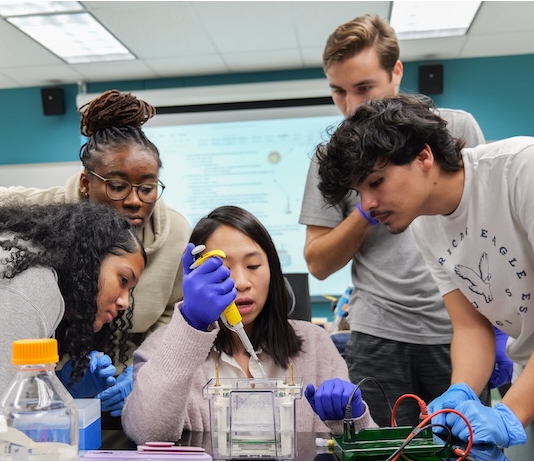
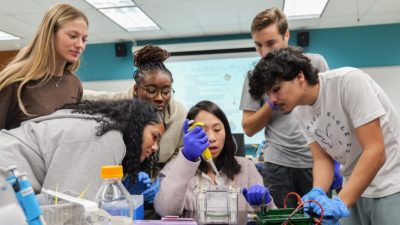
Assistant Professor of Biochemistry Matthew Shannon, PhD, and Stetson had to overcome long odds to win a much-coveted National Science Foundation S-STEM award.
But it happened.
In late August, Shannon received an email with the subject line of “NSF Award Notice for Award ID 2526861 – Amendment ID 000.”
The NSF S-STEM award totals $1,999,991 over six years to support 24 STEM scholars across two cohorts of 12 students, beginning in the Fall 2026 semester.

Specifically, the award includes support for academically talented students with financial need (up to $15,000 per year, with an expected average award of $12,500 for each student). Ultimately, the program is designed to retain, graduate and prepare those students for careers in STEM through evidence-based practices such as summer research, a discovery-focused and cohort-based curriculum, a summer bridge program, a themed colloquium each semester, and enhanced advising.
The official project title of the NSF award is “Providing Academic and Financial Support to Facilitate Career Exploration, Retention, Graduation, and Job Placement for Talented, Low-Income Students.”
Shannon will serve as the Principal Investigator. Co-principal Investigators are Holley Lynch, PhD, associate professor of Physics; Jason Evans, PhD, professor of Environmental Science and Studies; Michael Schroeder, PhD, assistant professor of Mathematics; and Lynn Kee, PhD, associate professor of Biology. Other personnel on the project management team include George Glander, PhD, professor of Physics and associate dean of the College of Arts & Sciences; Michael Eskenazi, PhD, associate professor of Psychology; Corie Charpentier, PhD, assistant professor of biology; Kristine Dye, PhD, assistant professor of Health Sciences and Biology; and Ben Tanner, PhD, professor of Environmental Science and Studies.
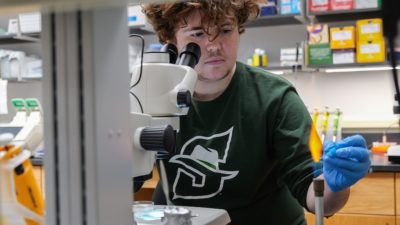
A discovery-based curriculum will be used for students in their first year of the program, with courses in four tracks: Life Sciences, Field Sciences, Mathematics/Computer Science and Biophysical/Chemistry.
Shannon recognizes not only the “profound impact” the award will have on the 24 STEM scholars, but also believes the lessons learned from the grant could help institutionalize high-impact initiatives at Stetson and across peer institutions to aid in retention, graduation and career placement.
“This is big,” he described.
Winning the Award
Getting there wasn’t easy, though.
With the understanding that a difficult road was ahead toward possible success, Shannon began brainstorming his NSF application approach more than a year ago. That was in summer 2024.
Stetson already had received such an NSF award in 2021, but the chances of a second win weren’t great, especially in current times when awards have dwindled. A few months later, however, Shannon attended a national STEM conference (the 2024 S-STEM Scholars & PI Meeting in Chicago) for students and principal investigators (Shannon is a co-PI on the 2021 award), and his conviction crystalized — calling the conference a “game-changer for realizing how valuable this STEM award program is for not only our school, but many other schools.”
While he still believed the NSF dollars would be difficult to obtain, he saw a path that was even harder to ignore. Shannon assembled a “pretty large team” at Stetson and “started really hammering away at writing this proposal.”
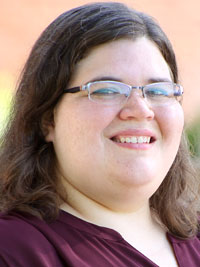
Fast-forward to today and the S-STEM award builds on Stetson’s previous success from 2021 while also reflecting the university’s commitment to innovative approaches, cited Lynch, noting that some students who benefitted from the previous NSF award will still be on campus when the new cohort arrives.
“We’re hoping they can serve as mentors for the incoming students, as students who have gone through four years of [the program] and know what some of the challenges are and how to overcome them,” Lynch explained.
Further, as the new program progresses, the professors plan to focus directly on career exploration and job placement. “We’ve set out very quantitative metrics,” said Shannon. “If we can send the large majority of these 24 students either to graduate school in STEM or directly into the industry in STEM, I think that would be a big win.”
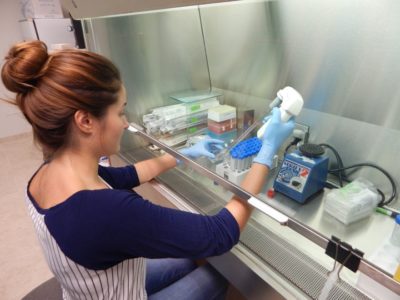
Accordingly, there will be ample “career research opportunities,” added Lynch — consistent with Stetson’s Hatter Ready initiative of providing students with immersive experiences to advance learning.
“We’re continuing to think about education and how to reach students in very creative ways. We’re not stagnated, we’re bringing in new ideas and trying new things,” she commented. “… A lot of the things we’re doing here align with the university’s strategic priorities.”
Kyle Longest, PhD, dean of the College of Arts and Sciences, agreed.
“The NSF S-Stem grant is a seminal program in Stetson fulfilling its mission and commitment to providing experiential, contemporary and integrative learning for all students,” Longest said. “This grant provides resources to help create a structured pathway that ensures access to unique opportunities in the sciences for students who often face challenges in pursuing these fields in higher education.”
In the end, a proud Shannon believes the NSF got it right in awarding Stetson.
“I think NSF and the folks who reviewed this really believe in us as a team and believe in Stetson,” he concluded. “I think we’ve demonstrated enough success with our current grant … That’s what makes another grant like this a great opportunity for our students.”
-Michael Candelaria



